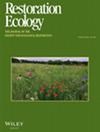印度尼西亚中加里曼丹公平而有弹性的热带泥炭地恢复原则
IF 2.8
3区 环境科学与生态学
Q2 ECOLOGY
引用次数: 0
摘要
印度尼西亚的热带泥炭地是全球重要的碳储存地,但近几十年来已严重退化。印尼加里曼丹中部的热带泥炭地面积占印尼热带泥炭地面积的 19%,当地的生计、文化习俗和土著社会关系与此密切相关。我们采用德尔菲调查和焦点小组讨论的合作方法,与来自不同学科的研究人员共同制定了修复愿景。在与参与中加里曼丹泥炭地恢复工作的不同利益相关者进行访谈时,这一愿景成为边界对象,使愿景得以完善和调整,并制定了实现愿景的原则。这些原则强调包容性和协作性的决策、规划和实施;适合当地社会和生态条件的因地制宜的方法;以及确保所有当地社会群体的知情同意和公平的利益分配。这些原则还强调采用全面、综合和长期的恢复方法,考虑多个方面,包括水文功能、植被再生、防火、适合当地的生计效益、包容性治理和适应性管理实践。这些原则是以恢复力为导向的社会生态恢复实践和政策制定的出发点,旨在促进公平、有效和具有恢复力的热带泥炭地恢复成果。本文章由计算机程序翻译,如有差异,请以英文原文为准。
Principles for equitable and resilient tropical peatland restoration in Central Kalimantan, Indonesia
Indonesia's tropical peatlands are crucial global carbon stores but have been heavily degraded in recent decades. We present seven principles for equitable and resilient tropical peatland restoration in Central Kalimantan, Indonesia, host to 19% of Indonesia's tropical peatland area, where local livelihoods, cultural practices, and indigenous social relations remain closely connected. Our collaborative methods employed a Delphi survey and focus group discussions with researchers from various disciplines to develop a shared vision for restoration. This vision served as a boundary object during interviews with diverse stakeholders involved in peatland restoration in Central Kalimantan, allowing for refinement and adaptation of the vision and the development of principles to achieve it. The principles emphasize inclusive and collaborative decision‐making, planning, and implementation; site‐specific approaches adapted to local social and ecological conditions; and ensuring the informed consent of and fair benefit distribution to all local social groups. They also emphasize a holistic, integrated, and long‐term approach to restoration that considers multiple aspects, including hydrological function, vegetation regeneration, fire prevention, locally appropriate livelihood benefits, inclusive governance, and adaptive management practices. These principles serve as a starting point for resilience‐oriented social‐ecological restoration practice and policy formulation, aiming to facilitate equitable, effective, and resilient tropical peatland restoration outcomes.
求助全文
通过发布文献求助,成功后即可免费获取论文全文。
去求助
来源期刊

Restoration Ecology
环境科学-生态学
CiteScore
6.50
自引率
15.60%
发文量
226
审稿时长
12-24 weeks
期刊介绍:
Restoration Ecology fosters the exchange of ideas among the many disciplines involved with ecological restoration. Addressing global concerns and communicating them to the international research community and restoration practitioners, the journal is at the forefront of a vital new direction in science, ecology, and policy. Original papers describe experimental, observational, and theoretical studies on terrestrial, marine, and freshwater systems, and are considered without taxonomic bias. Contributions span the natural sciences, including ecological and biological aspects, as well as the restoration of soil, air and water when set in an ecological context; and the social sciences, including cultural, philosophical, political, educational, economic and historical aspects. Edited by a distinguished panel, the journal continues to be a major conduit for researchers to publish their findings in the fight to not only halt ecological damage, but also to ultimately reverse it.
 求助内容:
求助内容: 应助结果提醒方式:
应助结果提醒方式:


